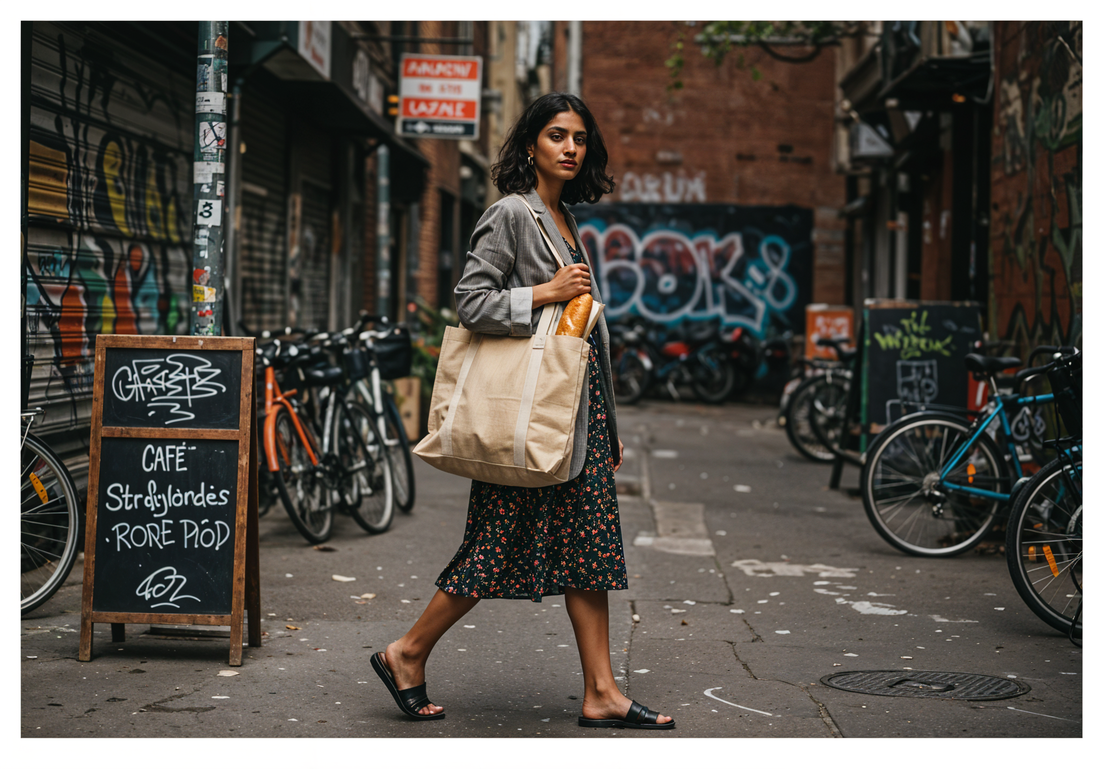There was a time when luxury came in glimmering packaging — gold-plated logos, impossibly high heels, suits that couldn’t quite breathe. But today, luxury has found a new vocabulary. It speaks softer, moves slower, and wears organic cotton. In the age of noisy trends and fast everything, small-batch fashion has emerged not just as a trend, but a quiet revolution.
And it’s winning hearts from Brooklyn to Bengaluru.
From Labels to Values
The modern shopper is no longer buying just a dress; they’re buying a story, a stance, a signal. What does your wardrobe say about your values? For a growing tribe of global consumers, especially millennials and Gen Z, the answer is clear: less is more, and meaning is everything.
Small-batch production, at its core, resists mass replication. It prioritises quality over quantity, artisanship over automation. Unlike fast fashion’s conveyor-belt clothing, brands like Harkoi Studio are making garments with intention, consciousness, and a fierce commitment to sustainability.
Take the Kiyo Dress in Gingham, for instance. It’s not just a dress. It’s an emblem of soft power — hand-dyed, tailored for comfort, and designed for longevity. It doesn’t scream for attention. It earns it.
The Appeal of Authenticity
In both India and the U.S., fashion fatigue is real. The sparkle of mall brands has dimmed under the harsh lights of climate change, overproduction, and supply chain exploitation. Consumers are asking: Who made my clothes? Where did this fabric come from? What happens after I throw this away?
Small-batch brands have an answer. And the answer feels — for lack of a better word — human.
When you slip into Haru Pants in Cobalt Texture, you’re not just dressing up; you’re dressing ethically. You’re honouring the hands that shaped the weave, the natural dyes that coloured it, the slow process that refused to be rushed.
Why 'Less' is the New 'More'
We live in the aftermath of maximalism. Capsule wardrobes, minimalism, and sustainable closets are not just Pinterest trends. They’re cultural shifts.
In India, urban shoppers are drifting away from over-embellished fashion and towards breathable fabrics, AZO-free dyes, and silhouettes that feel just as good in a Mumbai summer as they do at a Goa brunch. Meanwhile, American buyers are flocking to farmers' markets wearing relaxed-fit Fuji Shirts in Woven Checks, pairing them with linen trousers and a tote full of local produce.
It’s called "everyday luxe" — a wardrobe that lets you live in it, move in it, and stand for something while you’re at it.
The Beauty of the Imperfect
Mass production chases perfection. But handmade fashion understands something deeper: perfection is dull. Real beauty lies in the uneven dye, the asymmetric pleat, the human touch.
Small-batch collections like Rozana and Khatta Meetha celebrate this unpredictability. No two dresses are exactly the same — and that’s the point. When you wear a piece from these collections, you wear something that no one else in the world owns. That’s a luxury even the biggest brands can’t sell.
From Scroll to Soul
In the world of reels, it’s easy to get caught up in aesthetics. But the discerning shopper now wants more than just a pretty picture. They want fabric that breathes, silhouettes that last seasons, and ethics stitched into the very seams.
Harkoi Studio’s Suki Dress in Girard Pattern is a masterclass in storytelling through design. Inspired by modern art, shaped by Indian craftspeople, and created with eco-friendly textiles, it proves that thoughtful fashion can still turn heads.
This isn’t just about buying clothes. It’s about reclaiming style as a form of protest. As joy. As a daily act of choosing better.
The Global Shift
The shift isn’t niche anymore. According to The Business of Fashion, terms like “sustainable fashion brands USA” and “small-batch clothing India” have seen a 40% spike in search volume over the last year. NPR reported that Gen Z consumers are willing to pay more for clothing that aligns with their values. In India, platforms like The Summer House and Nicobar are echoing the same ethos: authenticity over artifice.
It’s not just the clothes that matter. It’s how they make you feel.
Style with Substance
At its heart, small-batch fashion is about slowing down. It’s about asking the right questions. And it’s about re-learning the joy of dressing well — not to impress the world, but to feel in tune with yourself.
It’s in the quiet confidence of the Rin Top in Pale Green. It’s in the way your skin breathes when wrapped in AZO-free dyes. It’s in the knowing nod from a stranger who sees your Silk Bandana and understands: you’re part of the tribe.
A tribe that values truth over trend. People over plastic. Presence over pretense.
Everyday Luxe is Here to Stay
And so, as fashion rushes on, Harkoi walks a little slower. Pauses a little longer. Creates in smaller batches. Not because it’s easier, but because it matters.
In a world that insists on more, small-batch fashion whispers a different truth: quality is the real luxury.
And that’s a wardrobe worth investing in.

